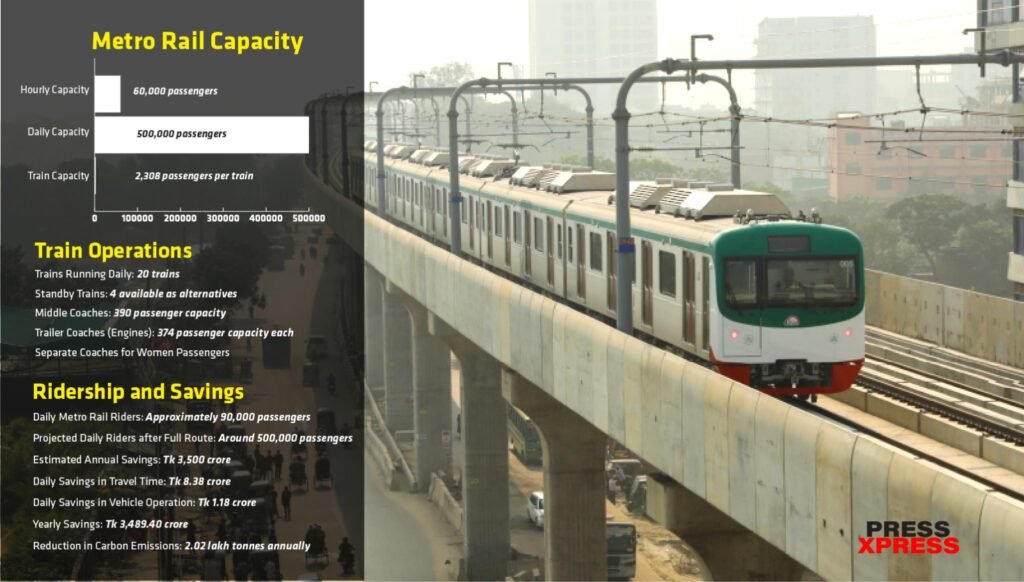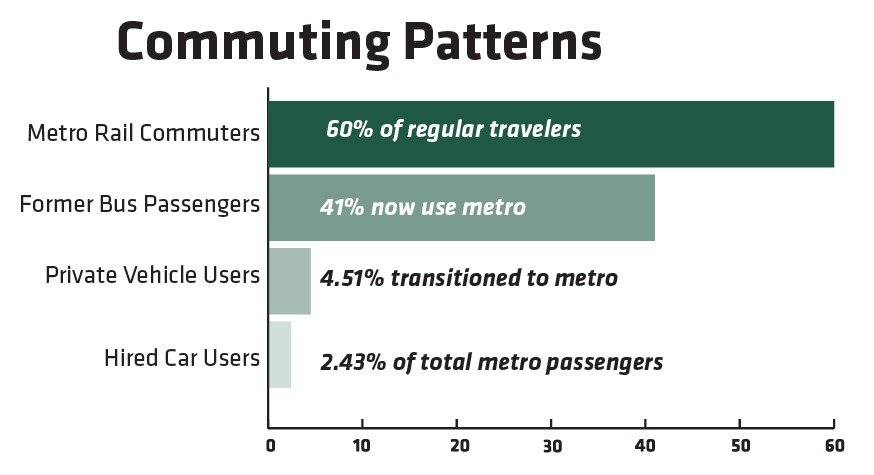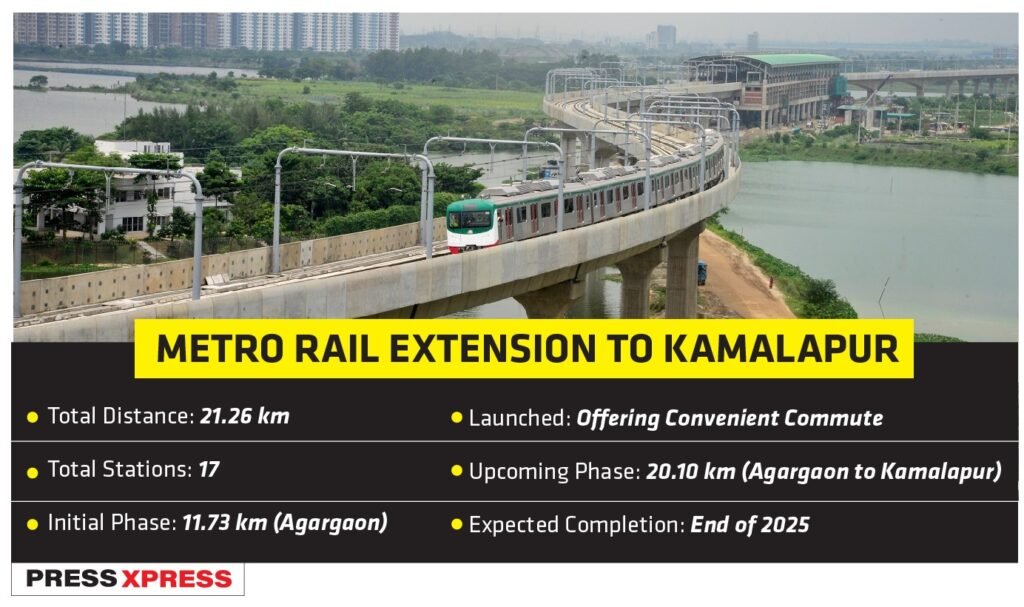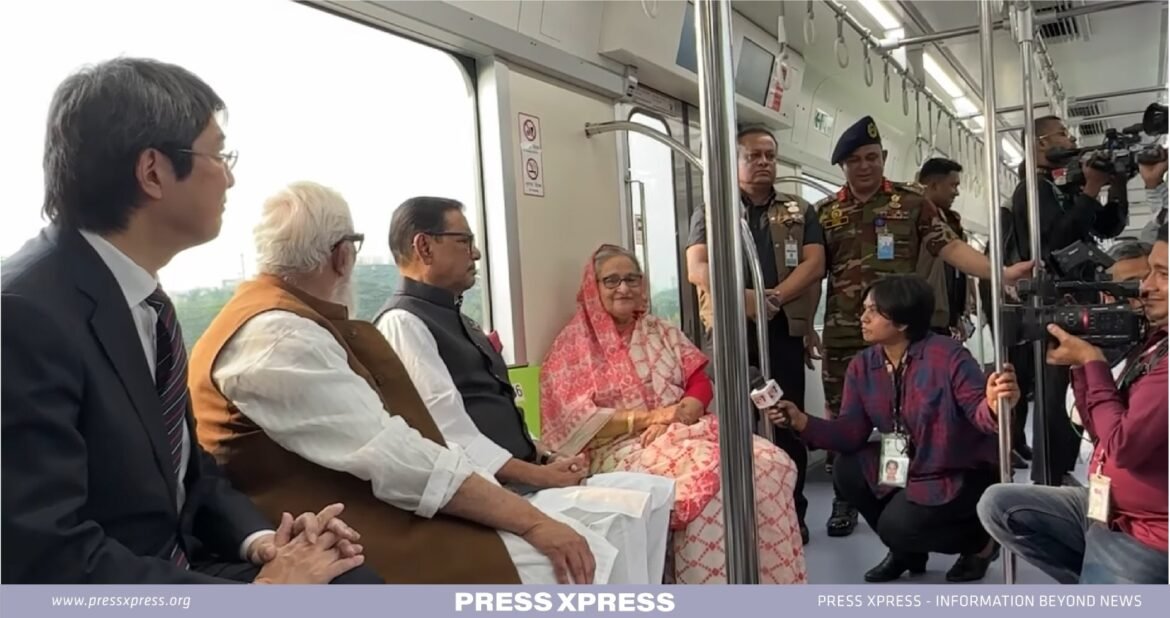- 11:30 am. Passengers can board on trains on the new section from 7:30am tomorrow
- Farmgate, Secretariat (Press Club) and Motijheel will be run at the beginning. Four additional stations, including Bijoy Sarani, Kawran Bazar, Shahbagh, and Dhaka University, will be operational within three months
- Once all 16 stations are operational, the journey from Uttara to Motijheel will take 38 minutes
- The ride from Agargaon to Motijheel will be just 14 minutes, 17 minutes to Uttara, and 31 minutes for the whole Uttara to Motijheel route
Prime Minister Sheikh Hasina has inaugurated the much-awaited metro rail service from Agargaon-Motijheel section.
For the inauguration, she reached Agargaon Metro Rail Station at 2:25pm on Saturday (4th November 2023) and opened the Agargaon-Motijheel section at 2:30pm.
Afterwards, the Prime Minister purchased a ticket at the station and embarked on a journey to Motijheel, marking the extension of the nation’s inaugural metro rail service from its origin in Uttara to Motijheel.
Speaking the media, Prime Minister Hasina stated her confidence in Bangladesh’s continual journey towards prosperity and development.
“It will save working hours, people will be benefited economically and move with the time,” she said.
She highlighted that commuters will now enjoy smooth and congestion-free travel.
“Today, we’re so delighted as we are opening metro rail movement between Uttara and Motijheel,” she said, adding, “we will extend it to Kamalapur Railway station.”
The Prime Minister also emphasized the government’s commitment to establishing an efficient transportation system in Dhaka since taking office in 2009.
At the same event, the premier also inaugurated the construction work of MRT Line-5 (Northern route), which will be a 20-km line from Hemayetpur to Bhatara via Gabtoli, Mirpur-10, Gulshan.
In her speech, premier also expressed, “Our aspiration is to elevate our nation into a hub of education, knowledge, and science. Our vision is to create a Smart Bangladesh, characterized by a smart population, smart government, smart economy, and a smart society. This is my foremost desire.”
Sheikh Hasina also stated, “My father’s quest for independence was driven by his vision of a better and prosperous life for the Bengali nation. I hold one steadfast belief: I will realize my father’s dream. I carry no ego; my devotion is to the well-being of our nation’s people. When our people find peace, my father will find peace, and I believe he is watching, content with our progress.”
She extended her gratitude to the Japanese government and all those involved in the project for their unwavering dedication in its successful implementation. “I cordially thanked JICA, ADB, Ministry of Road Transport and Bridges, DMTCL, law enforcers as well as all the people and workers involved with the works of metro rail. I am requesting all to use the metro rail with care. Keep it clean,” said PM Hasina.
Commuters will be able to ride the train from Uttara to Motijheel, starting November 5, as announced by the Managing Director of Dhaka Mass Transit Company Limited (DMTCL).
Additionally, it was noted that the regular metro service from Uttara to Agargaon was temporarily suspended on November 4 due to the inauguration event.
Earlier, on December 28, 2022, the Prime Minister officially opened the initial phase of the inaugural metro rail line, running from Uttara to Agargaon.
JICA’s role in Dhaka Metro Rail project:
- Supervising & Financing
- Financial: Tk 19,500 Crore

JICA Oversees Dhaka Metro Rail Project
The Japan International Cooperation Agency (JICA) has been supervising the development of the metro rail project and providing a soft loan to facilitate it. JICA’s financial support for the project totaled Tk 19,500 crore.
- Cost: Tk41,239 crore
- Target: 2028
Expanded Metro Rail Network
In addition to the inauguration of the Agargaon-Motijheel section, Prime Minister Sheikh Hasina will also initiate the construction work of the MRT Line-5 (Northern route). This ambitious project will span 20 kilometers, connecting Hemayetpur to Bhatara via important locations such as Gabtoli, Mirpur-10, and Gulshan. The project, with an estimated cost of Tk41,239 crore, is slated for completion by 2028. The extension of the metro rail network is a testament to the government’s vision for a more comprehensive and interconnected transportation system.
Step Toward Easing Congestion
The inception of the metro rail expansion comes as part of a broader initiative by the Awami League government to alleviate the traffic congestion and pressure on the capital city. These measures were set in motion following their ascent to power in 2009.
The metro rail system is expected to provide a significant boost to the transportation network, with the capacity to carry 60,000 passengers per hour and half a million passengers per day. Additionally, it’s designed to ensure that one train arrives at each station every four minutes.
Anticipated Passenger Increase and Cost Savings
According to the Metro Rail Authority, when the Metro Rail is fully operational, it can accommodate 60,000 passengers per hour and a total of 500,000 passengers per day. Each one-way train consists of six coaches, with a maximum capacity of 2,308 passengers. The route operates 20 trains daily, with an additional four standby trains available as alternatives. The middle four coaches in each train have a capacity of 390 passengers, while the two-sided trailer coaches (engines) can hold a maximum of 374 passengers each. Notably, all trains include separate coaches for women passengers.
According to metro rail authorities, approximately 90,000 passengers use the metro rail daily. With the full functionality of the Uttara to Motijheel route expected in about three months, this number is projected to increase to around 500,000 passengers daily. This significant shift towards public transportation is expected to yield substantial cost savings.
It is estimated that once the line becomes fully operational, it will save around Tk 3,500 crore annually in terms of travel time and vehicle operation costs. The authorities predict daily savings of Tk 8.38 crore in travel time cost and Tk 1.18 crore in vehicle operational cost, culminating in a yearly savings of Tk 3,489.40 crore. In addition to cost savings, the electricity-run trains will help reduce the number of other vehicles on the road, thereby cutting 2.02 lakh tonnes of carbon emissions annually.

An analysis of Dhaka’s metro rail commuters reveals that 60% of regular travelers in the past 10 months prefer the metro. Surprisingly, 41% of these were former bus riders who switched to the metro, while only 4.51% of private vehicle owners made the switch. The smallest group comprises hired car users at 2.43%. This highlights the evolving transportation choices in Dhaka, with the metro attracting a diverse range of commuters.
Extension of Metro Rail by 2025
The eagerly awaited extension of the Metro Rail up to Kamalapur, covering a distance of 21.26 kilometers, is set to be launched by 2025. This extended route will encompass a total of 17 stations, providing a comprehensive transportation network to serve the residents of Dhaka.

In the initial phase, an 11.73-kilometer section of this line, stretching up to Agargaon, has already been launched, offering a convenient mode of transit for the city’s commuters. The remaining stretch of 20.10 kilometers, connecting Agargaon to Kamalapur, is expected to become operational by the end of 2025. This significant expansion promises to enhance transportation options and further alleviate traffic congestion in Dhaka.
5 more metros by 2030
The ambitious plan to improve Dhaka’s transportation infrastructure by introducing five more metro lines by 2030 is making significant progress. The total cost of constructing MRT Line-6 amounts to a substantial 33,471.99 crore taka. A substantial portion of this funding, totaling 19,718.47 crore taka, is being provided through foreign financing, while the government is contributing 13,753.52 crore taka to make this essential project a reality.
The Dhaka Mass Transit Company Ltd (DMTCL) has a comprehensive plan to develop a total of five metro lines in Dhaka, spanning an impressive 129.90 kilometers. This extensive network will include both overground and underground sections, with 68.73 kilometers designated for the elevated tracks and 61.17 kilometers for the subway. The government is determined to ensure that all metro rail projects are completed by 2030.


